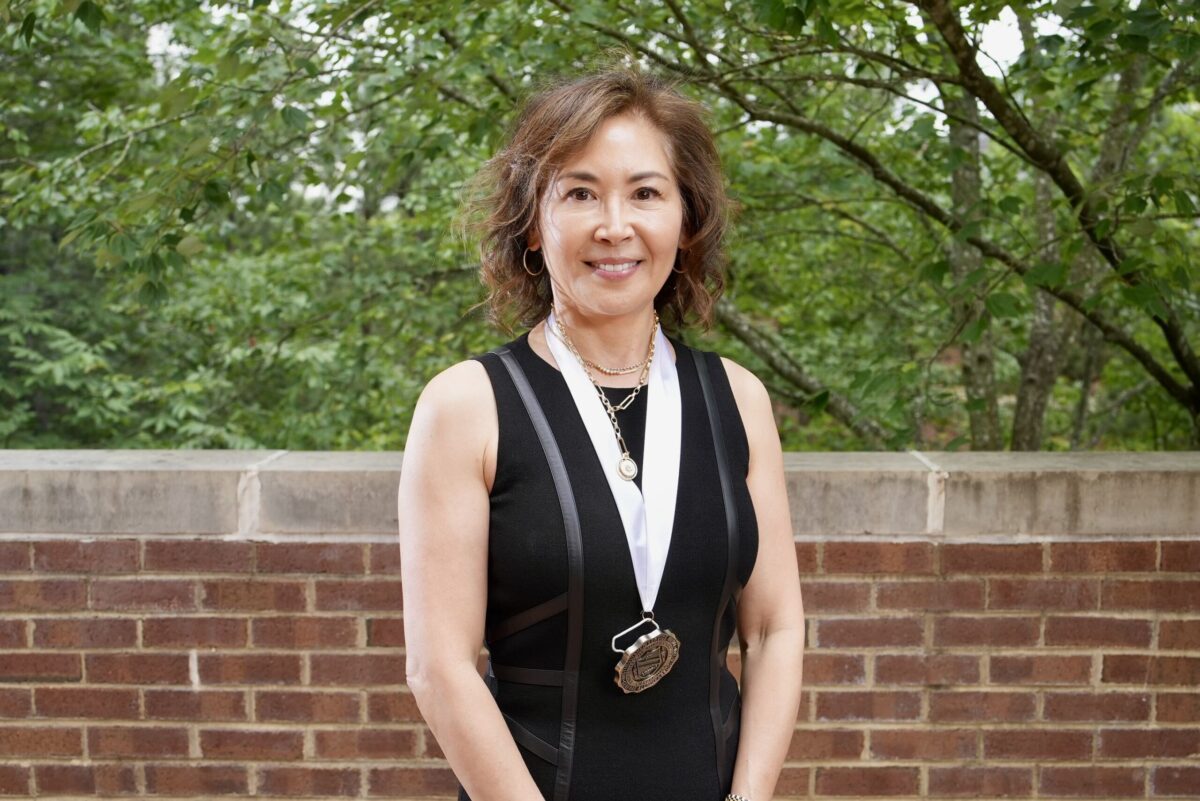Barbara Kilpatrick Lee ’88, Distinguished Service Medal Citation
Posted on May 13, 2023(Editor’s Note: The GAA’s Distinguished Service Medal citations, such as this one, are read to the audience at the Annual Alumni Luncheon and then presented as a keepsake to the recipients.)

Barbara Kilpatrick Lee ’88. Photo: Ray Black III
Think of planting a garden after it rains, when the soil is moist and easy to work with, ready to plant, and weeds can be plucked out effortlessly. That’s the philosophy Barb Lee ’88 applies in showing her educational video, I’m Not Racist … Am I?, to middle and high school students at an age when these future leaders of the next generation are most open to new ideas.
Lee, president of Point Made Learning and founder of Point Made Films Inc., uses techniques from documentary filmmaking to educate people about how bias, stereotyping and tribalism can create an environment antagonistic to diversity. She produces films and online courses that deliver messages in ways participants can absorb and take to heart. In her I’m Not Racist program, she reassures participants that they’re not racist but asks what they do to interrupt institutional racism around them.
A successful documentary filmmaker and co-chair of Duke’s Center for Documentary Studies, Lee eschews the ego-feeding milieu of film fests and commercial releases in favor of going directly to the people and organizations where her work can have the most impact — sometimes to the detriment of her company’s balance sheet. She pulled one of the first films she directed, Adopted, off Netflix and offered it free to the public. Fifteen years later, it’s been cited more than a dozen times in academic research on transracial adoption, and adoption agencies nationwide use it for new parent training. About 800 private schools showed the Point Made film The Prep School Negro, ensuring that the students and teachers who most needed to understand the message could view it.
Lee uses her talents as a storyteller to right wrongs and to bring about change. Her newest storytelling device teaches participants how to think and behave as anti-racists.
Lee grew up in Cherokee County with three strikes against her in the majority culture — she was Asian, Appalachian and female. Wanting to test her talents as a teen, she fought to go to Carolina, but her dad thought it was too far from home. After the two of them watched Michael Jordan ’86 hit the game-winning shot for the NCAA national championship in 1982, he softened and let his daughter apply.
Immediately after completing her journalism degree at Carolina, she entered the video production world, taking a job as a video technician at the N.C. School of Science and Mathematics. As a state employee, she could enroll in courses at UNC for free. She delved into screenwriting and film production classes and was selected as one of UNC’s first Hollywood interns.
Coming to a big university in a wealthy community from a small, poor town, Lee understood what it was like not to know what game was being played, much less how to win it. Memories of those years instilled in her an urgency to open doors for others and level the playing field. She has been generous in her mentoring and tenacious in making sure individuals take full advantage of opportunities.
A decade ago, a student at the journalism school struggled with his first film. On the spur of the moment, he asked Lee, who was on the J-school’s advisory board at the time, to give him some guidance. She quickly agreed, under one condition: “I’m going to be totally honest with you,” she told him. Lee was characteristically direct, clear and precise, and his film went on to much success.
Lee’s ability to see through distractions and her commitment to diversity and inclusion have served her well during her work on various boards. In 2005, she chaired UNC’s Board of Visitors. She was a founding member of the Alumni Committee on Racial and Ethnic Diversity, which strengthens relationships with alumni of color and encourages them to re-engage with the University, and she served on the Board of Visitors from 2008 to 2016, including as its chair. During that same period, she was a member of the journalism school’s board of advisers. In 2015, she delivered the J-school’s Commencement address. Also in 2015, she received UNC’s Diversity Award. Since 2018, she has served on the board of trustees of John Jay College of Criminal Justice in New York.
Lee was vice chair of UNC Performing Arts board of advisers when Emil Kang was UNC’s first executive director for the arts, and support was strong for opening access to the arts for students from remote areas. She was touched to see, during Swan Lake, the auditorium filled with school children who would otherwise never have had the opportunity to see a professional dance company perform the classical ballet.
Lee was crucial to the founding of the Asian American Center and recently accepted a spot on its board of advisers. The center has made a difference in the lives of many Asian students, helping them feel connected and at home on campus. “Her generation walked so this generation could run,” said a colleague at the center. “She’s very proud of seeing them run.”
The Distinguished Service Medal is presented by the GAA Board of Directors.
